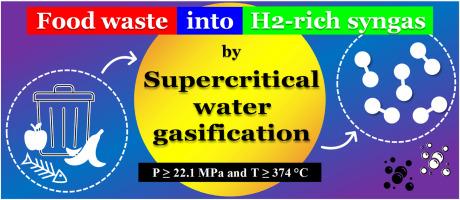Supercritical water gasification of food waste for hydrogen production
IF 16.3
1区 工程技术
Q1 ENERGY & FUELS
引用次数: 0
Abstract
The conversion of renewable biomass, particularly from food waste, into valuable energy sources via supercritical water (SCW) gasification is a promising approach for addressing environmental concerns related to sustainable energy generation, food waste, and socio-economic issues. In this sense, this review study covers the fundamental principles, process performance, and challenges of the gasification of biomass sourced from food waste by the SCW process. Additionally, it sheds light on advancements in SCW technologies (reactor design, operational conditions, catalysts utilization, etc.). The review explores the availability of food waste biomass, screens its chemical characteristics, and underscores the state-of-the-art methodologies focusing on the conversion of food waste into hydrogen-rich syngas. Thus, it outlines future research and development directions in this field, underscoring the importance of advancing SCW gasification technology for biomass valorization and waste management.

食物垃圾超临界水气化制氢
通过超临界水(SCW)气化将可再生生物质,特别是厨余生物质转化为有价值的能源,是解决与可持续能源生产、厨余垃圾和社会经济问题相关的环境问题的一种很有前景的方法。因此,本综述研究涵盖了超临界水工艺气化食物垃圾生物质的基本原理、工艺性能和挑战。此外,它还揭示了 SCW 技术的进步(反应器设计、操作条件、催化剂利用等)。综述探讨了食物垃圾生物质的可用性,筛选了其化学特性,并强调了将食物垃圾转化为富氢合成气的最新方法。因此,它概述了该领域未来的研究和发展方向,强调了推进 SCW 气化技术对生物质增值和废物管理的重要性。
本文章由计算机程序翻译,如有差异,请以英文原文为准。
求助全文
约1分钟内获得全文
求助全文
来源期刊

Renewable and Sustainable Energy Reviews
工程技术-能源与燃料
CiteScore
31.20
自引率
5.70%
发文量
1055
审稿时长
62 days
期刊介绍:
The mission of Renewable and Sustainable Energy Reviews is to disseminate the most compelling and pertinent critical insights in renewable and sustainable energy, fostering collaboration among the research community, private sector, and policy and decision makers. The journal aims to exchange challenges, solutions, innovative concepts, and technologies, contributing to sustainable development, the transition to a low-carbon future, and the attainment of emissions targets outlined by the United Nations Framework Convention on Climate Change.
Renewable and Sustainable Energy Reviews publishes a diverse range of content, including review papers, original research, case studies, and analyses of new technologies, all featuring a substantial review component such as critique, comparison, or analysis. Introducing a distinctive paper type, Expert Insights, the journal presents commissioned mini-reviews authored by field leaders, addressing topics of significant interest. Case studies undergo consideration only if they showcase the work's applicability to other regions or contribute valuable insights to the broader field of renewable and sustainable energy. Notably, a bibliographic or literature review lacking critical analysis is deemed unsuitable for publication.
 求助内容:
求助内容: 应助结果提醒方式:
应助结果提醒方式:


